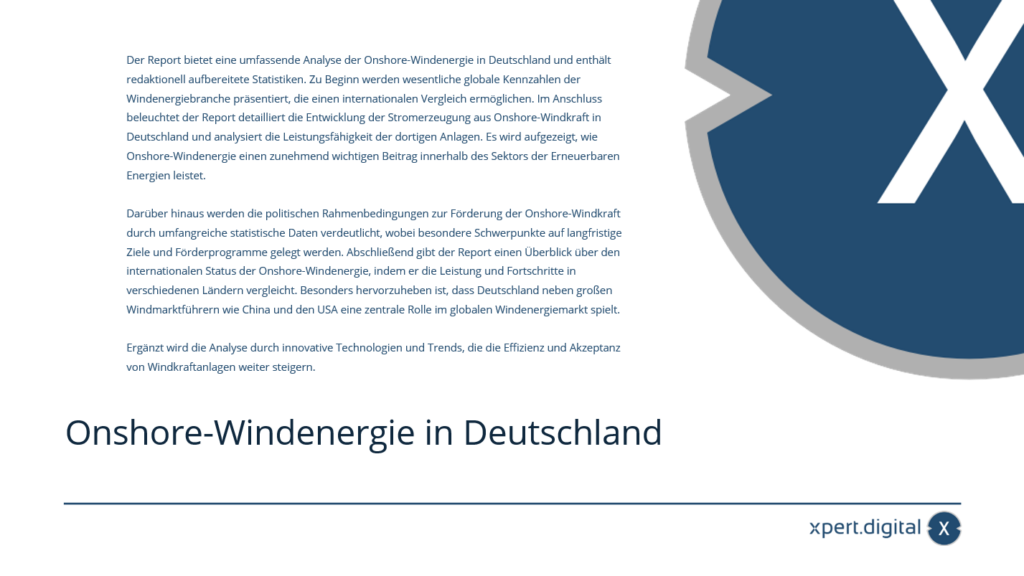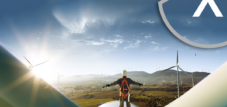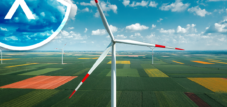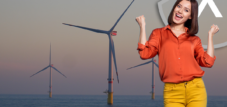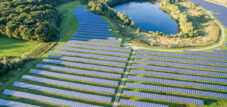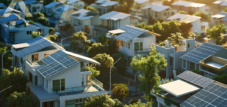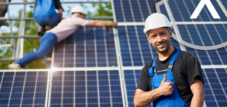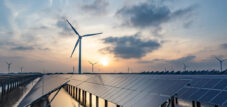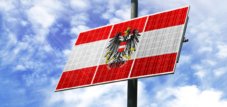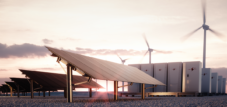Wind power in Germany: In 2023, its share of gross electricity generation from renewable energies was 43.9 percent
Language selection 📢
Published on: July 13, 2024 / update from: July 13, 2024 - Author: Konrad Wolfenstein
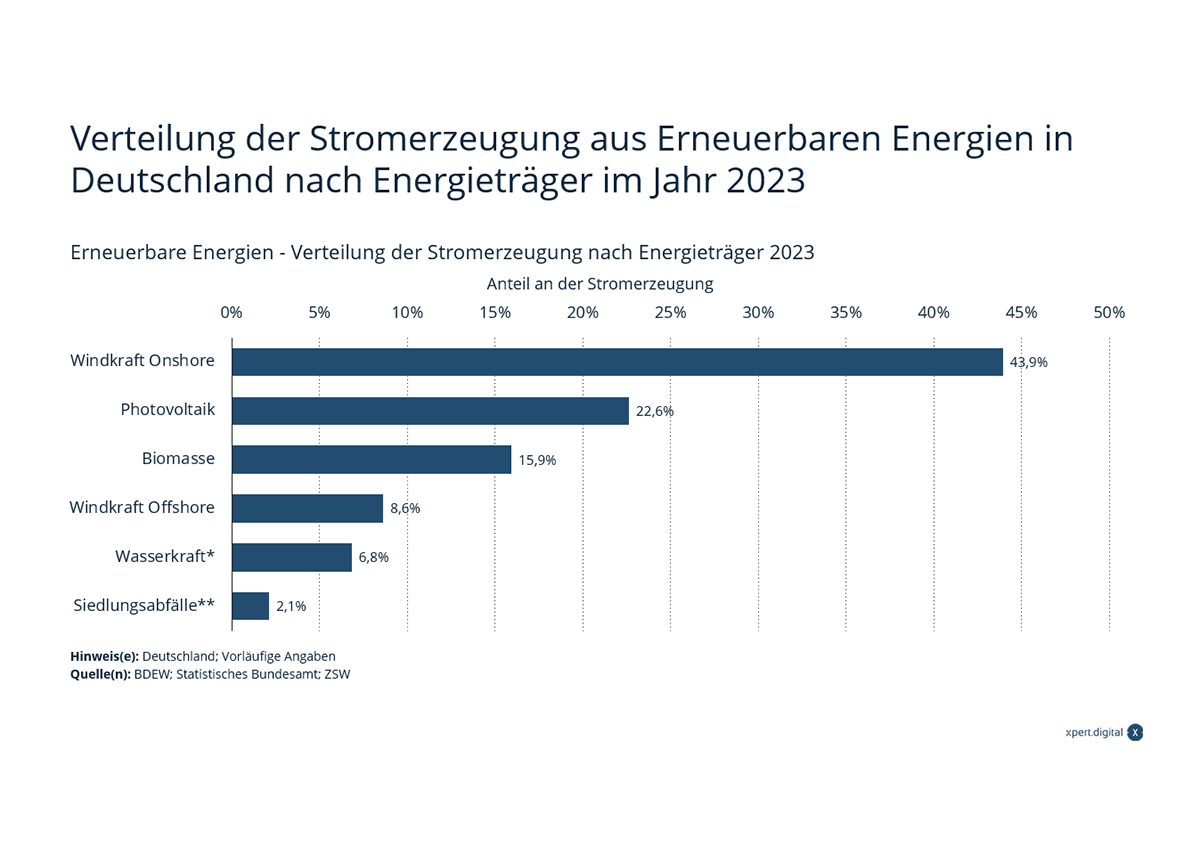
Wind power in Germany: In 2023, its share of gross electricity generation from renewable energies was 43.9 percent - Image: Xpert.Digital
🍃 Wind power: opportunities and challenges in modern energy supply
🌟 The importance of wind power in Germany
Germany is one of the leading nations in the field of wind energy. In 2022, Germany was one of the most important countries in the world in terms of installed wind turbine output, alongside China and the USA. The amount of electricity generated from wind energy has increased significantly in recent years, both on land (onshore) and at sea (offshore). This is also reflected in the statistics: The share of electricity generation from onshore wind power was 43.9 percent of gross electricity generation from renewable energy sources in Germany. Based on all energy sources, the contribution of onshore wind energy was around 24 percent in 2023.
🚩 Location selection and efficiency of wind turbines
The efficiency of wind turbines depends heavily on the location. Places with high wind speeds, such as open spaces, mountain regions and the sea, offer ideal conditions. Offshore wind farms, i.e. wind turbines off the coast, are particularly efficient, but also more expensive and more complex to build than onshore systems. Nevertheless, they play an increasing role as they can harness constant and strong wind, resulting in higher energy yield.
A disadvantage of onshore wind turbines is their potential impact on the landscape and their proximity to residential areas, which can be problematic due to noise and shadows. These factors make the location selection and approval processes a complex challenge.
💡 Technological advances and innovation potential
In recent years there have been significant technological advances in the field of wind energy. Modern wind turbines have become larger and more efficient. New materials and designs have improved the lifespan and performance of the systems. Digitalization also enables more precise control and maintenance of wind turbines, which reduces operating costs and increases reliability.
One promising area of innovation is the development of floating offshore wind turbines. This technology allows wind turbines to be relocated to deeper waters where stronger and more consistent winds prevail. Floating wind farms could therefore significantly increase the potential of offshore wind energy and overcome the geographical limitations of traditional offshore systems.
🚧 Challenges and solutions
Despite the progress and potential, wind energy faces several challenges. One of the biggest is the dependence on wind conditions. When wind strength is low or there is no wind, other energy sources have to be used, which affects the reliability of wind energy. To solve this problem, various approaches are being worked on:
1. Energy mix and storage technologies
Integrating wind energy into a broader energy mix that includes other renewable energies such as solar and hydropower can increase security of supply. In addition, energy storage technologies such as battery storage and power-to-gas systems are being developed and used to store excess electricity and make it available again when needed.
2. Network expansion and stability
The expansion and modernization of the power grids are crucial in order to compensate for the fluctuating feed-in from wind turbines. Smart grids, characterized by intelligent control systems, can improve the stability of the power grid and enable more efficient use of the energy produced.
3. Political and regulatory framework
Clear and supportive policies are essential to support the expansion of wind energy. This includes approval processes, financial incentives and investments in research and development. In Germany, a number of measures have been taken in recent years to accelerate the expansion of wind power, including adapting distance regulations and providing funding for innovative projects.
🌍 Future prospects for wind energy
The future of wind energy looks promising, especially if the existing challenges can be overcome and the technology's full potential can be exploited. With continued investment in research and development, greater integration into the energy mix and the use of advanced technologies, wind power can make an even greater contribution to global energy supplies.
Germany has set itself ambitious goals to further increase the share of renewable energies. By 2030, the share of wind energy in electricity generation is to be increased significantly in order to achieve climate goals and reduce dependence on fossil fuels. However, this requires not only technological innovations, but also social commitment and the population's acceptance of the expansion of wind turbines.
🌬️ Wind power is an indispensable component
Wind power is an essential component of the sustainable energy future. Despite its challenges, it offers enormous opportunities to reduce greenhouse gas emissions and create a secure and sustainable energy supply. Germany plays a leading role in the use of wind energy and can continue to become a global pioneer through continuous innovation and political support. The successful integration of wind energy into the energy mix will be crucial to achieving climate goals and securing a sustainable future.
📣 Similar topics
- 🌪️ The importance of wind power in Germany
- 📊 Efficiency of onshore and offshore wind turbines
- 🚀 Technological advances in wind energy
- 📉 Challenges and solutions in wind energy
- 🎯 Future prospects for wind energy in Germany
- 🏞️ Choice of location for wind turbines
- 🌐 Floating offshore wind turbines of the future
- ⚡ Energy storage technologies for more reliability
- 🏗️ Network expansion and smart grids for wind energy
- 🥇 Germany's pioneering role in the use of wind energy
#️⃣ Hashtags: #Wind Energy #Renewable_Energy #Energy Transition #Climate Protection #Technological_Innovation
🌬️ Challenges in wind energy expansion in Germany
In Germany, the expansion of wind energy faces significant challenges. In many federal states where wind turbines are planned, numerous projects have fallen behind schedule. This has far-reaching effects on the desired energy transition and the use of renewable energy sources in the country. There are significant delays in the completion of wind turbines, particularly in North Rhine-Westphalia, Brandenburg and Lower Saxony.
🕒 Delays and reasons
The expansion of wind energy in Germany is hindered by various factors. One of the main reasons for the delays is lengthy bureaucratic approval processes. It often takes years for a wind turbine to receive all the necessary permits, resulting in significant delays. There are also transport difficulties when delivering wind turbine components and rising material costs, which make the projects more expensive.
🗺️ Regional differences
The delays are not evenly distributed across the country. North Rhine-Westphalia tops the list of affected federal states, followed by Brandenburg and Lower Saxony. This reflects regional differences in approval processes and logistical challenges.
🎯 Target value not reached
Even if all planned wind turbines were completed on time, the desired target for overall output would still be a long way off. Current estimates show that the total output of wind power in Germany is currently around 72.4 gigawatts, which is around 37 percent below the desired target value.
🌍 Energy transition and climate protection
The expansion of wind energy is crucial for the German energy transition and climate protection. Renewable energies, including wind energy, are expected to account for a significant share of electricity generation in Germany and reduce dependence on fossil fuels. The delays in the expansion of wind power could jeopardize the achievement of these goals.
🚀 Measures to accelerate
The federal government has recognized that measures must be taken to promote the expansion of wind energy. This includes simplifying approval processes, improving infrastructure for the transport of wind turbine components and promoting innovation in the wind energy industry.
💼 Economic impact
The wind energy industry has the potential to provide significant economic benefits, including job creation and investment in the regional economy. However, delays in expansion could affect these positive effects.
🌎 International perspective
Germany is not alone with these challenges. The expansion of renewable energies and especially wind energy is important worldwide in order to combat climate change. Other countries are experiencing similar difficulties in implementing their renewable energy transition.
📣 Similar topics
- 🌬️ Wind energy expansion in Germany: challenges and opportunities
- 💼 Bureaucratic hurdles: delays in the wind power sector
- 🗺️ Regional differences: Wind energy projects in Germany
- ⚡ Target value missed: The level of wind energy output
- 🌍 Energy transition and climate protection: The role of wind energy
- 🚀 Measures to accelerate: ways to expand wind energy
- 💰 Economic Impact: Wind Energy and the Economy
- 🌎 International perspective: Wind energy worldwide
- 🏗️ Infrastructure problems: Logistical challenges in the wind power sector
- 🌿 Sustainable future: wind energy and renewable energies
#️⃣ Hashtags: #Wind Energy #Energy Transition #Climate Protection #Delays #RenewableEnergy
🌿🍃 The delays in the expansion of wind energy in Germany are a serious obstacle to the energy transition and climate protection. It is crucial that measures are taken to overcome these obstacles and advance the expansion of renewable energy, particularly wind energy, to achieve the country's long-term energy goals.
Plan your solar system for the most common applications conveniently online with our solar system planner!
With our user-friendly solar system planner you can plan your individual solar system online. Whether you need a solar system for your home, your business or for agricultural purposes, our planner offers you the opportunity to take your specific requirements into account and develop a tailor-made solution.
The planning process is simple and intuitive. You simply enter relevant information. Our planner takes this information into account and creates a tailor-made solar system that meets your needs. You can try out different options and configurations to find the optimal solar system for your application.
Additionally, you can save your plan to review later or share with others. Our customer service team is also available to answer your questions and provide support to ensure your solar system is optimally planned.
Use our solar system planner to plan your individual solar system for the most common applications and advance the transition to clean energy. Start now and take an important step towards sustainability and energy independence!
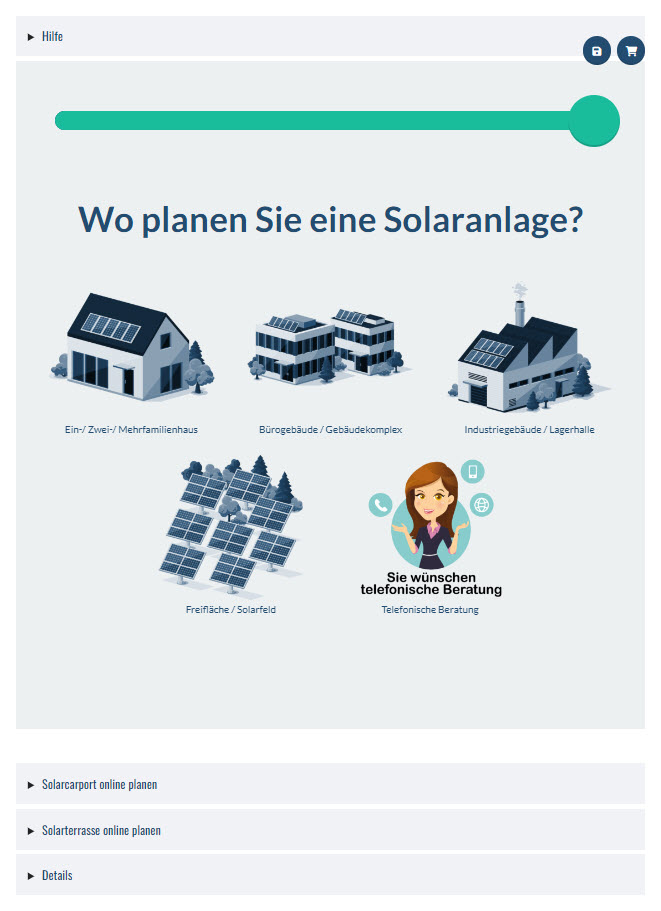
The solar system planner for the most common applications: Plan the solar system online here - Image: Xpert.Digital
More about it here:
We are there for you - advice - planning - implementation - project management
☑️ Expert advice on energy-efficient renovation and new construction
☑️ with solar solutions and heat pumps/air conditioning systems
I would be happy to serve as your personal advisor.
You can contact me by filling out the contact form below or simply call me on +49 157 30 44 9 555 .
I'm looking forward to our joint project.
Xpert.Digital - Konrad Wolfenstein
Xpert.Digital is a hub for industry with a focus on digitalization, mechanical engineering, logistics/intralogistics and photovoltaics.
With our 360° business development solution, we support well-known companies from new business to after sales.
Market intelligence, smarketing, marketing automation, content development, PR, mail campaigns, personalized social media and lead nurturing are part of our digital tools.
You can find out more at: www.xpert.digital - www.xpert.solar - www.xpert.plus



